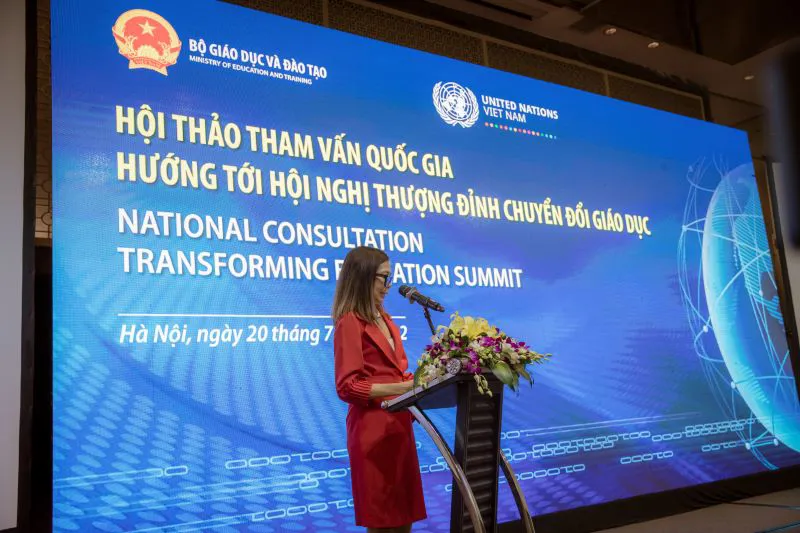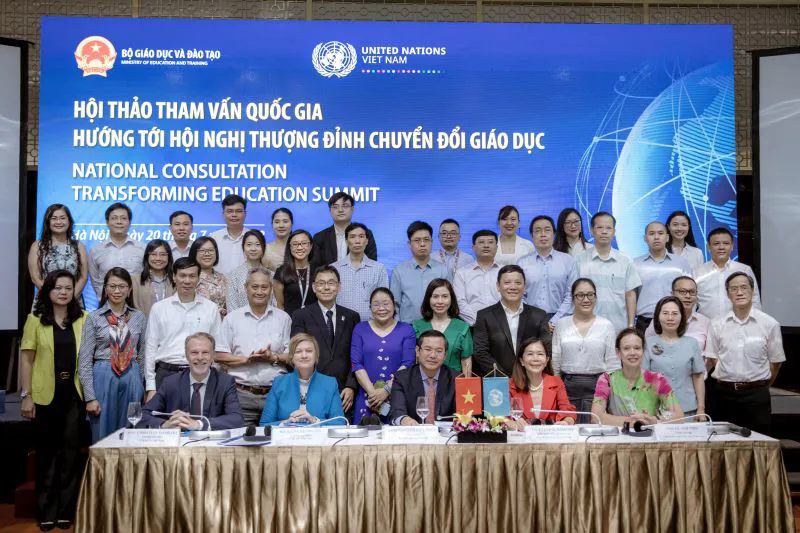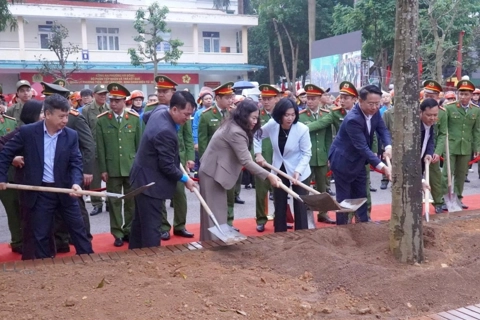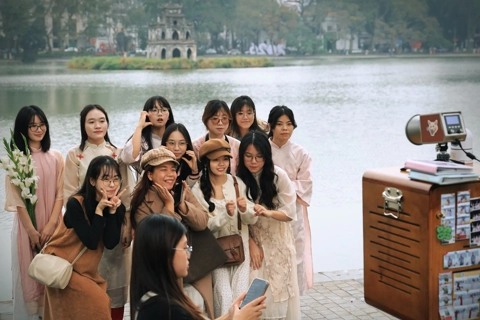Vietnam urged to renovate education for SDG target
Vietnam should reaffirm its approaches to the achievement of inclusive and equitable quality education and promote lifelong learning opportunities for all.
United Nations bodies have called for a revamp in Vietnam’s education sector to help the country achieve Sustainable Development Goals (SDG) by 2030.
Experts from the United Nations Children's Fund (UNICEF) and the United Nations Educational, Scientific and Cultural Organization (UNESCO) have developed a shared vision, commitment, and alignment of actions across constituencies to transform education in Vietnam according to the 2030 Agenda for Sustainable Development.
| United Nations Resident Coordinator to Vietnam Pauline Tamesis speaks at the national consultation held on July 20. Photos: UNICEF |
“With SDG4 in mind, to ensure that all children and young people complete equitable and quality education, an education that leads to relevant and effective learning outcomes by 2030, it is time for a revamp,” said Pauline Tamesis, United Nations Resident Coordinator to Vietnam.
The ideas were shared at a national consultation on transforming education held by the Ministry of Education and Training (MoET) with support from UNICEF and UNESCO with the participation of key stakeholders, including relevant ministries, universities, schools, and organizations of persons with disabilities.
The outcomes of this consultation will contribute to the Transforming Education Global Summit in September, as convened by the United Nations Secretary-General António Guterres.
The Global Summit seeks to reimagine education systems for the world of today and tomorrow and to revitalize national and global efforts to achieve SDG4 on inclusive and equitable quality education.
For that reason, Tamesis said it’s necessary to prioritize the issues in the education sector that will help Viet Nam achieve the education-related SDG targets: issues such as inequity in access, learning loss, digital divide, gender gaps, education financing gaps, and specific needs of education for particular groups of children and young people.
Notably, she called for stakeholders to make space and hear the voices of children and young people – those she named “most affected”. “As a part of this national consultation and the global summit, the United Nations is consulting young people, listening to their experience, as well as the solutions that they want to contribute; recognizing them as important partners at the table in the transformation of education,” she noted.
| Participants at the event: UNESCO Vietnam Country Representative Christian Manhart (1st from left), UNICEF Representative to Vietnam Rana Flowers (2nd left). |
Sharing the same idea, Christian Manhart, UNESCO Vietnam Country Representative, said the consultation comes at a critically important time, as Vietnam rethinks and reaffirms its approaches to the achievement of SDG4. He believed that the results of this discussion will be important contributions to the global drive. At the meeting, he affirmed UNESCO’s active support to education systems all over the world to engage in a global debate on how knowledge, education, and learning need to be reimagined in a world of increasing complexity, uncertainty, and precarity.
Meanwhile, Rana Flowers, UNICEF Representative to Vietnam, highlighted innovative approaches, saying that they are needed to serve as levers for game-changing transformations of education policy and practice in the medium and long term.
“Therefore, active involvement and support of different government ministries, such as health, labor, environment, social development, finance, information and telecommunications, and youth are essential to ensure the commitments are turned into action, with an investment to reform”, she shared.
In this regard, participants at the national consultation shined a light on crucial steps to address key challenges faced by the education system with the objective of ensuring the right investment to tackle the learning loss; to guarantee children and young people learn in safe and healthy schools; to skill children for the world of work today and in the future; and to ensure that SDG 4 is brought back on track.
The pandemic has caused the most massive disruption in learning in recorded history. Data from the SDG Indicators on Children and Women Survey conducted by Vietnam’s General Statistics Office (GSO) in 2020-2021 confirmed the wide digital divide, and the lack of good information and communication technologies (ICT) skills among girls and boys, which limits their access to distance learning.
Data showed that the divide has broadened between ethnic groups, rural and urban areas, and the richest and poorest segments of the population. It also spotlighted worrying trends, including the gender disparity, with a mere 51.4% of boys completing upper secondary compared with 65% of girls. This makes it much harder for children to acquire the technical and higher-order skills needed to thrive in increasingly demanding labor markets.
In addition, a recent study supported by UNICEF showed that there has been a significant increase in the number of upper secondary children facing mental health challenges, which requires urgent action across sectors: education, child protection, health, and social protection.
Sustainable Development Goal 4 aims at ensuring inclusive and equitable quality education and promoting lifelong learning opportunities for all. This goal ensures that all girls and boys complete free primary and secondary schooling by 2030.
| Children at a school in Hanoi. Photo: The Hanoi Times |















